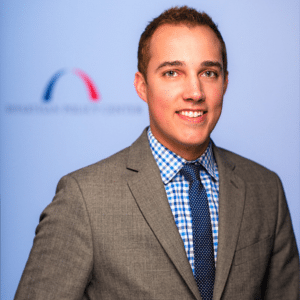Media Training Case Study: Preparing The Experts
The Bipartisan Policy Center’s experts dive deeply into the issues and challenges facing the United States. When they emerge, they use that knowledge to prompt healthy public debate and policy change. Recently, when this Washington, D.C.-based think tank sought some knowledge on how to better position those experts as media resources, it turned to our custom media training workshops.
 “We have many excellent (experts) here on staff, but we had not, in a number of years, really had a formal (media) training,” says Jordan LaPier, the associate director of media relations for the organization.
“We have many excellent (experts) here on staff, but we had not, in a number of years, really had a formal (media) training,” says Jordan LaPier, the associate director of media relations for the organization.
Specifically, the Bipartisan Policy Center hoped to give its experts the tools and resources to better convey key messages during media interviews and increasingly become the experts that journalists turned to for quotes and information.
Media Interviews: Experience is Key
After a couple of group and one-on-one sessions with Throughline Partner Christina Mozaffari, the institute’s experts learned how to better hone their messages, to more effectively provide the information journalists were looking for, and communicate those messages across varied media.
As LaPier puts it:
“I think what our experts got out of the media training was greater confidence in their abilities, a better way to organize their thoughts, and practice they wouldn’t otherwise get in a variety of interview settings.”
LaPier says the time and attention Mozaffari, a former broadcast journalist, put into the research prior to the media training workshops made the sessions extremely effective.
“I was so impressed by the amount of preparation that Christina put into every one of these sessions,” he says. He adds that the breadth of the participants’ expertise meant she took a deep dive of her own into economic policy, national security, immigration, health care, and other topics.
That preparation, he said, made the nearly two dozen in-depth interviews with subject matter experts as true to life as possible.
Several aspects of those media training sessions have had lasting effects. LaPier recalls a few:
Engaging in Real-life Scenarios

Although you can learn something new with every media interview, they are generally far from a “practice” session. Media guests must be on their game when it comes to live, recorded, or print interviews.
However, given experience is a valuable teacher, the practice interview sessions that the center’s experts participated in offered real-life scenarios without the real-life consequences. They learned how to:
- Manage challenging questions
- Share their key messages from the very start
- Adjust to the interview needs and demands of journalists in varied media
LaPier notes:
“We really put our experts in a lot of different scenarios and gave them familiarity and comfort with the idea that they could do an interview in any context.”
Maximizing Your Messages
Developing key messages that you want to convey is just one part of the heavy lifting. There comes a time when you share those main points during a media interview. During this media training, participants picked up tips and techniques – including the questions they should ask to help their messages stick and become part of the story.
Here are a few of those questions:
- Do we have the personal stories that back up our policy decisions?
- Have we made sure that our supporting stories drive the main message home?
- Are our perspectives clear?

Organizing Your Thoughts
Journalists typically are not shy about poking holes into the positions, or responses, of their sources. A well-informed source, who can quickly access information, becomes a valuable source. They not only convey their key messages, but also make sure their perspective is a part of the story.
LaPier says through the exercises, the center’s experts – who arrived with a substantial grasp of a number of complex topics – learned techniques to frame their key messages and have supports at the ready for whatever the question, however long the interview lasted, and in whatever medium it occurred. That learning largely occurred as participants practiced and gained the confidence that they had the material and the methods to deliver their key messages.
The training also reinforced several other organizational strategies, including:
- The value of advance prep for every interview
- The creation of consistent messaging across all platforms, externally and internally
- The importance of establishing strong relationships with journalists
As LaPier notes:
“My responsibility is to make sure I can get (reporters) on the phone with our experts as fast as possible. And, with this training and these tools, our experts are now giving those reporters more of what they need. It’s been incredibly beneficial for us.”


